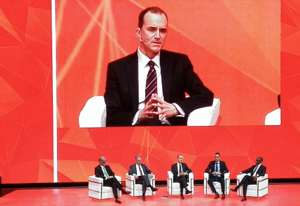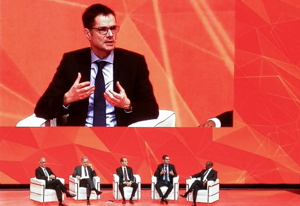BHGE AM '18: Execs push global responsibility for local projects
FLORENCE — by Adrienne Blume, Executive Editor, Hydrocarbon Processing and Editor, Gas Processing
On Tuesday morning of the 2018 BHGE Annual Meeting (BHGE AM), an executive panel moderated by Uwem Ukpong, Chief Global Operations Officer of BHGE, examined procuring global capacities to meet local needs.
The panelists included Michael Utsler, COO of Woodside Energy; Stefano Cao, CEO of Saipem; Paul Mayland, COO of Cairn Energy; and Reinhard Ontyd, CCO of Nord Stream 2 AG.
Utilizing local resources for major projects. Mr. Ukpong first asked Mr. Mayland how Cairn supports its long-term assets as it works in different regions. The COO named the "three Rs"—respect, responsibility, and relationships—as the most essential components.
"We need to understand what a country's needs are in its interactions with an upstream company," Mayland said. "We are there as a guest of the host country, and we act in accordance with that at all times."
Mayland went on to explain how small-scale steps to understanding the needs of each country often result in more significant steps that are long-lasting and appreciated. He gave the example of Senegal, where Cairn began working in 2013. The company has trained and employed local Senegalese over its three appraisal phases over the last five years.
Mr. Cao picked up on this thread, saying, "It's important to change the approach of our presence in countries where we operate." He said the traditional approach—which involves entering a country, establishing offices and developing projects—has become too expensive. In the new energy world, it is important to do more work with local authorities and to transfer know-how and capabilities to local workers.
Mr. Utsler seconded the importance of demonstrating that a company is a guest of the host country. "The first things we hear are: local content, local jobs and local supply when possible," Mr. Utsler said. It is important to consider what resources are needed to deliver promises to host countries, and to collectively and collaboratively develop businesses, the COO said.
Mr. Ontyd noted that the two pipelines from Russia to Germany that will make up the Nord Stream 2 project will be operational at the end of 2019, with the help of 30,000 contractors from various European countries.
Enabling responsible project outcomes. Mr. Ukpong noted that efficiency and productivity must be complimentary with social responsibility. He asked the panelists about achieving the right balance when working in foreign countries.
Mr. Mayland emphasized the importance of listening to what the local stakeholders say and trying to identify, together, what are the priorities. He gave the example of Senegal, where Cairn encountered an issue with waste going to a landfill unnecessarily. In the last phase of appraisal drilling, Cairn was able to change the overall process with the help of a local contractor, resulting in less than 1% of all waste produced going to the landfill.
Mr. Utsler commented, "You can create a contractual term of one-contract-at-a-time jobs if you work together, or you can create companies and businesses. Those companies not only enable the project you're working on right now, but they also enable future projects."
Good relationships encourage project success. In concluding the panel discussion, Mr. Ukpong asked the panelists to share their final messages, from the point of view of an operator/contractor, on working with foreign governments and populations.
Mr. Utsler quipped, "You have to remember that you are given one mouth and two ears. You have to understand local capabilities and priorities. You have to ask: What can you supply, support and deliver locally? What resources can you access and develop both locally and regionally? It's important to have partners of choice—partners at an enterprise level, like BHGE—that can do things that we cannot do as a smaller company."
Mr. Cao noted that, with the digital revolution, different ways are needed to work with clients as contractors. "Technology is not enough, and willingness of people is not enough," the CEO said. "We need to do some work on the compliance side of the process."
"In a digitized world," he continued, "we need to build up a much more collaborative approach, which implies that we must make the compliance rules compatible with the new world. This isn't often talked about, but it's important to take into consideration and start acting on it."
Mr. Mayland emphasized the importance of transparency in operations. He commented, "In all projects, wherever we operate, we need to be conscious that we may be doing great engineering, but that it has to be safe and it has to be responsible. We need to be proud of that. We're bringing energy to change and transform people's lives. There's a clear level of transparency about everything we do, and as an industry we have to get comfortable with that."
Mr. Ontyd summarized the discussion succinctly, reminding the audience, "How we act is the basis for procedures. We want to have good relationships with contractors both large and small. This is what brings success."
The BHGE AM is taking place in Florence, Italy from 29–30 January, featuring technology demonstrations and a number of discussions by executives from BHGE and its operating partners.








Comments